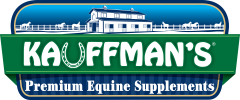Common Nutrient Deficiencies in Horses
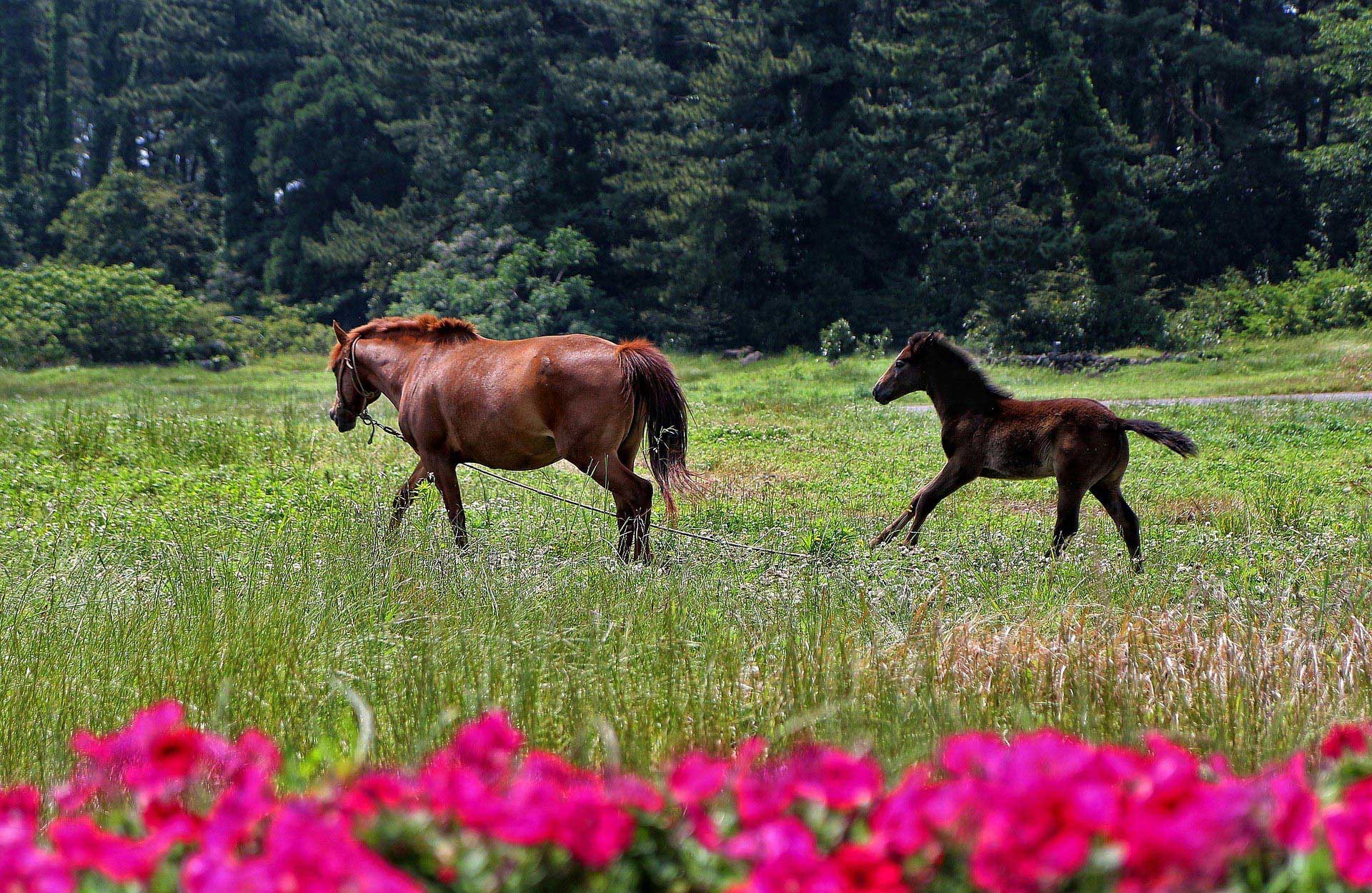
As horse owners, we always strive to provide our companions with the best. From the veterinarian and farrier we choose to the feed and hay we select, we’re always thinking of our horse’s health. Even with the best care, however, nutritional deficiencies can appear.
For many owners, it’s a challenge to spot even the most common nutrient deficiencies in horses. Most deficiencies are sub-clinical, meaning they don’t provide that visual clue that’s something amiss, like a cut, abscess or even colic does. Those that are clinical, like an energy or calorie deficiency, are easier for owners to discover as they cause a noticeable difference in your horse, like weight loss.
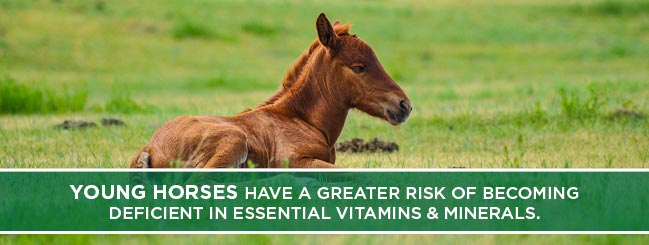
While older horses are prone to nutritional deficiencies, as the loss of their teeth can make it difficult to eat hay and grass, younger horses are at the greatest risk for nutritional deficiencies. Horses that have a high chance of becoming deficient in essential vitamins and minerals include:
- High-performance horses
- Broodmares
- Foals
- Weanlings
- Yearlings
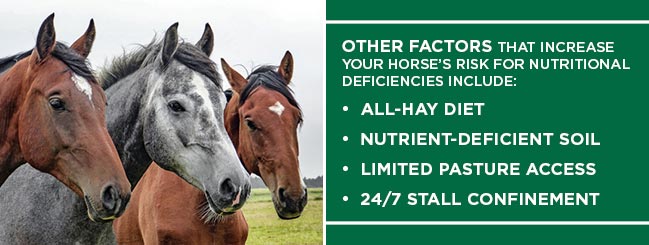
Other factors that increase your horse’s risk include:
- All-hay diet
- Nutrient-deficient soil
- Limited pasture access
- Around-the-clock stall confinement
As demonstrated by the above risk factors, nutritional disorders in horses are impacted the most by diet. While equines produce some nutrients on their own, like Vitamin C, they depend on receiving other minerals and vitamins through their diet. That’s why hay and grass quality is such an important factor to horse owners.
Several variables affect the quality and nutrient content of your pasture and hay. These include:
- Available water
- Climate
- Soil fertility
- Soil content
- Plant species
- Growth stage
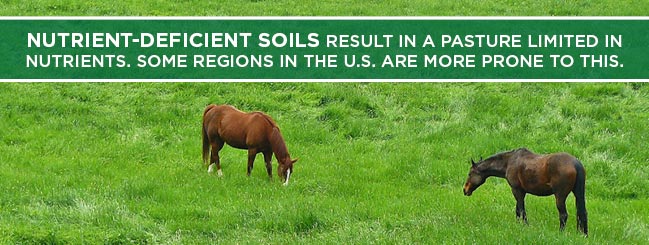
As expected, nutrient-deficient soil results in a pasture limited in nutrients. Some regions of the U.S., including the East Coast, are more prone to having nutrient-deficient soil. Selenium, for instance, is an essential mineral that land in the Midwest and East Coast, as well as parts of the West Coast, is limited in.
With soil and pasture-management practices, owners and farmers that make hay have the tools to ensure their soil supports a field that’s rich in the nutrients horses require to thrive. Droughts and heat waves, however, can affect even the most dedicated efforts and leave your pasture and hay nutrient deficient.
So, what else can you do to prevent a nutritional disorder in your horse?
Already, many horse owners include concentrated feed in their horse’s diet, which helps supply them with nutrients throughout the year. Another step is adding a supplement — with or without feed — to ensure your horse is receiving the exact nutrients they need, which vets often recommend for horses with a higher risk of developing a deficiency. Essentially, you and your horse can take a proactive approach.
And what better way to start that approach than by learning about the common nutrient deficiencies in horses? Not only will you learn about the symptoms, but you’ll also understand the role these vitamins and minerals play in your horse’s life and how you can ensure your horse always has enough of them.
Nutritional Disorders in Horses
Nutritional disorders in horses include various vitamin and mineral deficiencies. The most common deficiencies to watch for include:
1. Energy Deficiency
A calorie or energy deficiency is a clinical deficiency, so it produces visible, measurable symptoms, which include:
- Weight loss
- Dull haircoat
- Muscle deterioration
- Cracked hooves
As with humans, calories provide your horse with the energy and power to perform. For high-performance horses, pregnant or lactating mares and horses under two years of age, their energy demands are higher, which means they require additional hay, grain or pasture-time.
Supplements like corn oil can also give your horse the calorie content they need to not only gain weight back but also keep it on throughout the year. Older horses or even picky eaters that are struggling to maintain their weight also benefit from the nutritional boost a weight-gain supplement provides.
2. Protein Deficiency
Another clinical nutritional disorder in horses is a protein deficiency. While often linked to the energy that calories offer, proteins serve a different function. They provide your horse with amino acids, which support your horse’s connective tissues, including their bones and muscles.
When your horse lacks protein, you may see the following signs:
- Dull haircoat
- Muscle loss
- Reduced appetite
- Stifled development
- Slow hoof growth
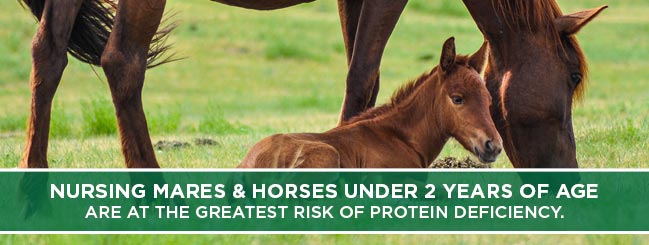
Horses under two years of age and nursing mares are at the greatest risk for a protein deficiency. Recommended protein levels for foals, weanlings and yearlings range from 16 to 12, while a lactating mare requires a protein level as high as 13 during the first three months. In comparison, a high-performance horse’s recommended level is 11.5.
Restoring your horse’s protein to normal levels can happen within a week, depending on your treatment plan. Because a protein deficiency can leave horses under two years of age with lasting effects, it’s essential you start a treatment program as soon as possible. Supplements that provide amino acids, especially lysine, are recommended for a faster recovery.
3. Selenium Deficiency
Selenium deficiency is one of the most common nutrient deficiencies in horses as selenium-deficient soils are common in many parts of the U.S. Its role in your horse’s health is as an antioxidant. Some of its additional functions include:
- Controlling thyroid hormone levels
- Preserving muscle integrity
- Maintaining the immune system
While selenium deficiency does produce minor symptoms — in mild cases — it can often go undetected because of vitamin E. The two nutrients share several similarities and responsibilities, which is why a horse with normal vitamin E levels and low selenium levels may never produce symptoms.
It’s also why the symptoms of vitamin E and selenium deficiency in horses are similar and include:
- Dull coat
- White muscle disease
- Muscle tissue breakdown
- Diminished performance
- Limited immune function
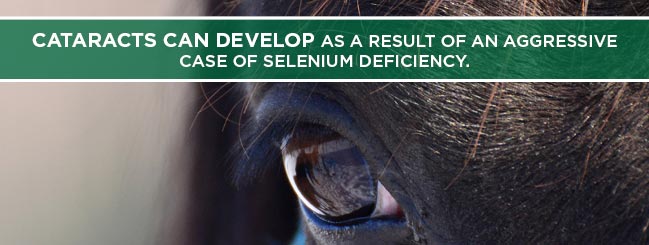
More severe symptoms, such as cataracts, can develop in aggressive cases of selenium deficiency. As a preventative measure, many owners with high-performance horses opt for a selenium and vitamin E supplement to ensure their horses’ selenium, as well as vitamin E levels, remain normal.
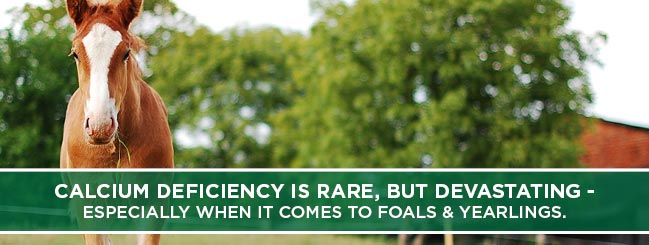
4. Calcium and Phosphorus Deficiency
One of the unique nutritional disorders in horses is a low calcium and phosphorus level. While separate minerals, these nutrients must be in balance with one another. In fact, mature equines require a one-to-one ratio, while growing horses need a two-to-one ratio of calcium to phosphorus.
Signs of an imbalance depend on which mineral is deficient. Symptoms of a calcium deficiency in horses include:
- Abnormal skeletal development
- Lameness
- Brittle bones
- Fractures
- Bran disease
- Minimal growth
- Loose teeth
- Lethargy
- Retained placenta
- Difficult births
- Seizures
- Trembling
A calcium-deficiency is rare, but because calcium works within your horse’s skeletal muscle, its side effects are devastating on developing horses, such as foals and yearlings, as they’re often bone-related. Meanwhile, a phosphorus deficiency affects your horse’s muscles and glucose use, causing the following symptoms:
- Muscle weakness
- Trembling
- High glucose and fat levels
Depending on your horse’s diet, your short- and long-term treatment plan may include reducing their grain and adding legume hay, if possible. Supplements are an additional option to consider. For breeding farms, providing a calcium and phosphorus supplement, like our Dicalcium Phosphate, to broodmares and foals is a preventative measure that can help maintain balance.
5. Salt Deficiency
Every horse owner knows horses require salt, which is why it’s an uncommon nutritional disorder in horses. The role of salt, or sodium and chloride, is to regulate your horse’s bodily fluids. Salt also assists during digestion by helping form hydrochloric acid, as well as helps in the conduction of electrical impulses across nerves and muscles.
If your horse develops a salt deficiency, possible symptoms include:
- Decreased appetite
- Dehydration
- Lethargy
- Lack of sweat
- Reduced muscle coordination
- Lowered milk production in lactating mares
High-performance horses that live in a more humid, hotter climate are more susceptible to a salt deficiency as they sweat more, which is one way salt leaves the body. Even though some regions of the U.S. and activities can increase your horse’s chance of a salt deficiency, it’s easy to prevent one from happening.
Salt or mineral blocks are the best course of action and should always be available for your horse to use. Some owners also opt to include salt on their horse’s feed, but in most cases, a salt block is both an effective treatment and preventative measure. You can also add electrolytes to your horse’s diet, which is recommended if they’re active.
6. Iodine Deficiency
Iodine, like a betadine scrub, is a first-aid staple among horse owners and barns. It’s also a trace mineral that your horse uses to regulate its basal or resting metabolism, which is accomplished by iodine synthesizing two hormones produced by the thyroid.
This mineral deficiency in horses produces the following symptoms:
- Swelling of the thyroid
- Dry and dull haircoat
- Hair loss
- Decreased growth and bone calcification
- Thickened skin
- Low body temperature
Foals, as well as horses under two years of age, are more prone to this nutritional disorder. Foals born to a mare with an iodine deficiency often have a high mortality rate as they struggle to nurse and have persistent hypothermia, as well as develop numerous joint and bone abnormalities.
The good news is an iodine deficiency is rare because feeds often contain the iodine your horse needs. Iodized salt blocks are also available, which provide your horse with both their salt and iodine needs. You can add a concentrated vitamin-mineral supplement to your horse’s diet, too. We recommend, however, talking to your vet beforehand, as pregnant and lactating mares are more sensitive to an increase in their iodine levels.
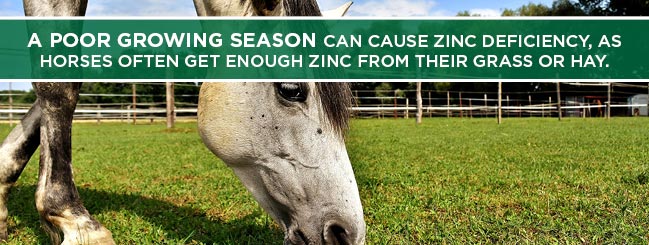
7. Zinc Deficiency
Horses often receive enough zinc through their grass and hay, but a poor growing season from a drought or heat wave can result in a decrease in zinc levels. Within your horse’s body, zinc participates in bone development, as well as in the health of their hooves and skin. It also helps metabolize proteins and carbohydrates.
Symptoms of this mineral deficiency include:
- Low insulin levels
- Decreased glucose tolerance
- Insulin resistance
- Dull coat
- Poor hoof quality
- Orthopedic diseases
Foals tend to need more zinc than adult horses because it helps with their development and wards off developmental orthopedic disorders, which is why orthopedic diseases are a side effect of zinc deficiency. A convenient preventative for horse owners is adding a supplement, like our Brewer’s Yeast, which provides essential proteins, zinc and phosphorus.
8. Copper Deficiency
Copper plays several roles in your horse’s body, as it’s a component of numerous enzymes. These enzymes take part in the synthesis and maintenance of elastic connective tissue and body pigment melanin. They also help mobilize iron stores, as well as assist in the stabilization of bone collagen.
Without enough copper, your horse may develop the following symptoms:
- Orthopedic diseases
- Abnormal cartilage or bone development
- Faded coat color
- Aorta rupture
As one of the less common nutritional disorders in horses, you don’t have to be on high alert for this deficiency. If your horse is less than two years old, however, or is a broodmare, it’s recommended to keep an eye out for any possible deficits or even a potential toxicity as the most severe side effects often affect these two groups.
To ensure your horse is receiving the copper they need, you can include grain in their diet. Feed manufacturers tend to keep copper levels on the low side to prevent toxicity, so including an additional supplement, such as a vitamin-mineral one, is a viable option.
9. Potassium Deficiency
One of the most common nutrient deficiencies in horses, especially high-performance equines, is potassium. Like salt, potassium is lost through sweating and urination, which is why high-performance horses training or competing in humid areas are at an increased risk for deficiency.
Potassium is a crucial mineral. It plays a significant role in maintaining your horse’s acid and base balance, as well as in muscle and nerve functions and cellular osmotic pressure, which is a process that helps cells remain hydrated.
When your horse doesn’t have enough potassium, you may see these symptoms:
- Fatigue
- Restlessness
- Decreased eating and drinking
- Spookiness
Outside of high-performance horses, most owners can trust that their horse is receiving enough potassium through their hay and grass, which is often rich in potassium. For horses in hot and humid climates that compete, it’s recommended to provide an electrolyte, like our apple-flavored electrolyte. You can also use vitamin-mineral supplements to give your horse several of the nutrients they need to hit the trail or trot across the ring.
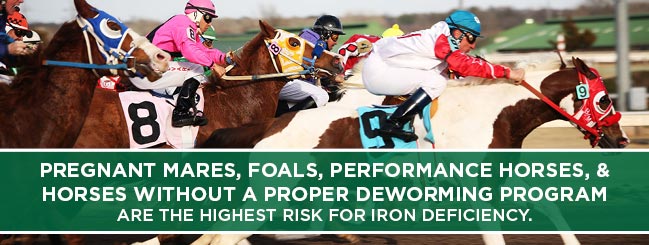
10. Iron Deficiency
An iron deficiency is one of the least common nutrient deficiencies in horses. In fact, iron toxicity is more common. Iron’s functions are divided between transporting oxygen throughout the body and assisting with muscle myoglobin, enzymes and storage forms.
While pregnant mares, foals and performance horses are all at risk of becoming iron deficient, horses without a proper deworming program also have an increased chance of developing an iron deficiency as parasites, such as those in the intestine can cause chronic blood loss.
Symptoms of this mineral deficiency in horses include:
- Fatigue
- Anemia
- Reduced performance
Because of how rare iron deficiency is, veterinarians usually become involved. Depending on the severity, they’ll provide your horse with an iron infusion and try to determine the cause. In some cases, they may recommend a new deworming program, as well as suggest including a comprehensive vitamin-mineral supplement for the long term.
11. Magnesium Deficiency
Another rare deficiency is magnesium. Your horse’s body, on average, has 60 percent of its magnesium stores in its skeletal structure. The remaining 40 percent is involved in metabolism, nerve impulses and the contraction of muscles.
Symptoms of a magnesium deficiency in horses only include muscle tremors, which researchers believe may result from an imbalance between potassium and magnesium. Studies on foals, which induced magnesium deficiencies, found more unsettling symptoms, including death.
Because a magnesium deficiency is so rare, many owners can rest assured their horse is healthy. If you already provide your horse with our supplements, they likely contain magnesium. Our Kauffman’s® Coat, Skin & Weight, for instance, includes magnesium to support your horse’s health.
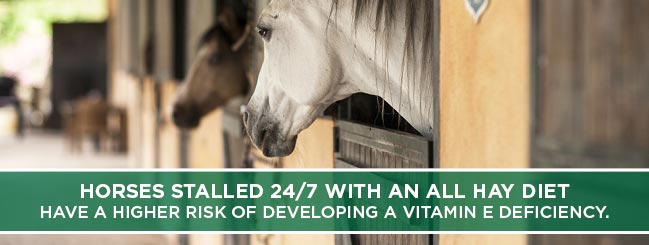
12. Vitamin E Deficiency
Horses stalled 24 hours a day and seven days a week with an all-hay diet have a substantial risk of developing a vitamin E deficiency. This vitamin is involved in several essential functions, with roles in the immune, nervous, circulatory, muscular and reproductive systems. It’s also crucial for absorbing vitamin A and serving as an antioxidant.
As mentioned above, the symptoms of vitamin E and selenium in horses are similar because of their shared functions as an antioxidant. With that said, the signs of a vitamin E deficiency include:
- Inflammation
- Equine motor neuron disease (EMND)
- Equine degenerative myoencephalopathy (EDM)
- Slower growth rate
- Swollen tongue
- Tissue inflammation
- Yellow-fat disease
- White muscle disease
- Infertility
- Ocular Lesions
Hay often provides the vitamin E horses need, but the concentration of this vitamin decreases over time. So, the hay you’re feeding throughout the late winter and spring has a lower amount of vitamin E than what you fed during the fall and early winter. Feeding alfalfa can offset the breakdown factor of vitamin E.
For assurance, many owners opt to give their horse a vitamin E supplement. Some choose a pelleted supplement to feed alone, while others may pick a powdered supplement to spread over their horse’s grain. As many of these supplements include additional minerals and vitamins, they contribute to the overall goal of preventing nutritional disorders in your horse.
13. Vitamin A Deficiency
The availability of vitamin A is identical to vitamin E. Like vitamin E, it’s found in hay and decreases with time in concentration. The role of vitamin A is a bit different, though. While it assists in bone and muscle growth, as well as with the reproductive and immune system, its most significant role is supporting your horse’s vision.
That’s why the signs of vitamin A deficiency are often visual and include:
- Night blindness
- Tearing of the eyes
- Dull haircoat
- Brittle hooves
- Weight loss
- Decreased appetite
- Reproductive issues
What’s unique about vitamin A is that horses can store it in their liver for up to six months and then release it as needed. Foals are an exception, however. They’re born vitamin A-deficient and rely on the colostrum in their mother’s milk to receive vitamin A.
While not one of the common nutrient deficiencies in horses, some owners like to include a vitamin A supplement in their horse’s diet. And if you’re already providing your horse with a complete vitamin-mineral supplement, like our B-500, they’re receiving vitamin A.
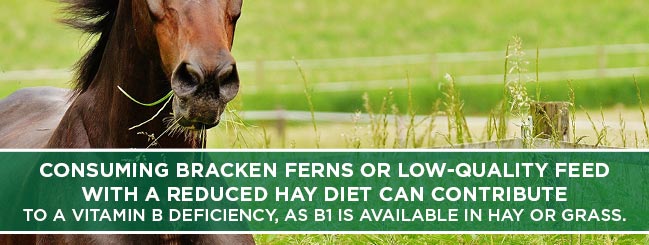
14. Vitamin B Deficiency
Vitamin B is a bit different than other essential vitamins, like A, C and D. It includes a complex of vitamins, which include:
- Thiamine (B1)
- Riboflavin (B2)
- Niacin
- Pantothenic acid
- Pyroxidine (B6)
- Biotin
- Cobalamine (B12)
- Folacin or folic acid
These vitamins help your horse perform by assisting with the metabolism of proteins, lipids and carbohydrates, as well as helping synthesize DNA, red blood cells, epinephrine and norepinephrine. For most of the vitamin B complex, veterinarians and researchers haven’t noted any signs resulting from deficiency.
B1 deficiency does exist, however, and can cause the following symptoms:
- Loss of appetite
- Weight loss
- Fatigue
- Diarrhea
- Nerve inflammation
- Irregular heartbeat
Consuming bracken ferns is one of the biggest causes of B1 deficiency, as vitamin B is often readily available in hay and grass. Low-quality feed combined with a reduced diet of hay, however, can also contribute to a deficiency. For peace of mind, some owners choose to provide their horse with a vitamin B1 supplement.
15. Vitamin C Deficiency
One of the nutritional disorders in horses that is a focus of breeders as well as owners of older horses is a vitamin C deficiency. Equines produce this antioxidant — which supports your horse’s skeletal, dental and immune health — on their own.
Long-term stress, such as when weaning a foal or following surgery, or increased age can reduce the liver’s production of vitamin C, however, and cause the following symptoms:
- Decreased immune function
- Dull haircoat
- Increased healing times
To restore your horse’s healthy level of vitamin C, veterinarians often recommend using a vitamin C supplement. Because modifying your horse’s grain, hay or turnout time won’t affect their vitamin C production, a supplement is one of the only options available.
16. Vitamin D Deficiency
One of the less common nutrient deficiencies in horses is a vitamin D deficiency. The well-known “sunshine vitamin” helps maintain plasma calcium concentrations and mobilizes stored calcium and increases the absorption of calcium and phosphorus.
In instances of deficiency, symptoms can include:
- Decreased bone strength
- Slowed growth
- Irregular growth plates
- Stiff and swollen joints
- Bone calcification
With daily exposure to sunlight, as well as access to sun-cured hay, this is a nutritional disorder in horses that you won’t have to worry about. It’s important to note, though, that like vitamin E and A, the concentration of vitamin D in hay decreases over time at a rate of 7.5 percent each month.
Prevent Common Nutrient Deficiencies in Your Horses With Kauffman’s®
Nutrient deficiencies encompass many different vitamins and minerals, from selenium and vitamin E to calcium, phosphorus and vitamin C. Researchers and veterinarians are still studying the role of these nutrients in our horses with the intention of answering several fundamental questions, including:
- What is a horse’s daily requirement for a nutrient?
- How does an excess of that nutrient impact them?
- How does a reduction of that nutrient affect them?
- What influence does a horse’s age, sex and condition have on their nutritional requirements?
Through their research, we’ve learned about the breakdown of vitamin E, A and D in hay, as well as the fact that foals are born vitamin A-deficient. We’ve also discovered that some nutrients, like phosphorus and calcium, require a balance to keep your horse happy and healthy. For owners, it’s a lot of information and symptoms to review and remember.
As an owner, however, you know your horse. Just observing your horse each day, from watching them eat and drink to seeing their performance in the ring, can let you know when something’s wrong.
Of course, being aware of the most common nutrient deficiencies in horses and their symptoms, as well as understanding the role of these nutrients, helps you become a more informed owner and gives you the tools to ensure your horse is always at their peak performance. It also helps you know how you can prevent and treat a nutrient deficiency.
Diet is often at the center of every treatment. Whether it’s putting out a salt block, changing your graining amounts or using a supplement, your goal is to give your horse the nutrients and minerals they need to train, perform or just roam around the pasture.
Providing your horse with a supplement year-round gives you peace of mind and assurance. It also compensates for factors outside your control, from a poor growing season to soil lacking in essential nutrients. Plus, it gives your horse a treat to look forward to after a day of competing.
At KAUFFMAN’S®, a division of Daniel Baum Company, we’re a family-owned business of animal lovers. That’s why we’re focused on developing and manufacturing all-natural supplements that can help your horse feel their best. It’s also why we produce our equine supplements in the U.S. at our state-of-the-art facilities, which are certified by the American Feed Industry Association’s Safe Feed/Safe Food Certification Program.
Most of all, it’s why horse owners trust us. Give your horse a tasty treat — and meet their nutritional needs — by browsing our selection of equine supplements today!
